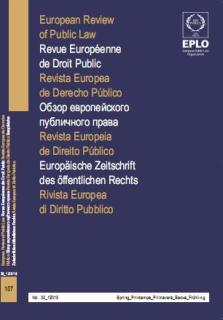
The Right to Be Forgotten:
The Balance between the Right to Privacy
and Freedom of Expression
Associate Professor in Public Law, Södertörn University, Stockholm
According to the landmark judgement Google Spain of 13 May 2014 of the European Court of Justice, search engines have under certain conditions the obligation to de-index search results (URLs) containing personal information. This obligation to execute the so-called right to be forgotten does not apply however when the interest of the public of having access to the information at issue overrides the right of privacy of the data subject, which emphasises the question of the balancing between the right to privacy and the freedom of expression. The paper first contains a succinct analysis of the criteria referred to by the European bodies, the EJC and the Article 29 Data Protection Working Party, for achieving the balancing between the right to privacy and the freedom of expression. Second, the paper examines the actors involved in the balancing of interests when the right to be forgotten is applied, i.e. the actors whose freedom of expression is potentially restricted by the application of the right to be forgotten and the actors in charge of the balancing of interests.
Conformément à l’arrêt clé rendu par la Cour de justice de l’Union européenne le 13 mai 2014 dans l’affaire Google Spain, les moteurs de recherche ont sous certaines conditions l’obligation de supprimer les résultats (URL) contenant des informations personnelles. Cette obligation de mettre en œuvre le “droit à l’oubli” ne s’applique toutefois pas quand l’intérêt du public à avoir accès à l’information en cause prime le droit à la vie privée de la personne concernée, ce qui met en exergue la question de l’équilibre entre le droit à la vie privée et la liberté d’expression. Cet article contient, premièrement, une analyse succincte des critères mentionnés par les organes européens, la CJUE et le G29 afin de parvenir à un équilibre entre le droit à la vie privée et la liberté d’expression. En second lieu, il examine les acteurs impliqués dans la balance des intérêts quand le droit à l’oubli est appliqué, à savoir les acteurs dont la liberté d’expression est potentiellement limitée par la mise en œuvre du droit à l’oubli et les acteurs chargés de procéder à la balance des intérêts en présence.
* This paper mirrors an introductory presentation for a workshop on The Right to Be Forgotten: The Balance between the Right to Privacy and Freedom of Expression, that took place on September 9, 2017 at the Legraina EPLO premises, Sounion, Greece.





















